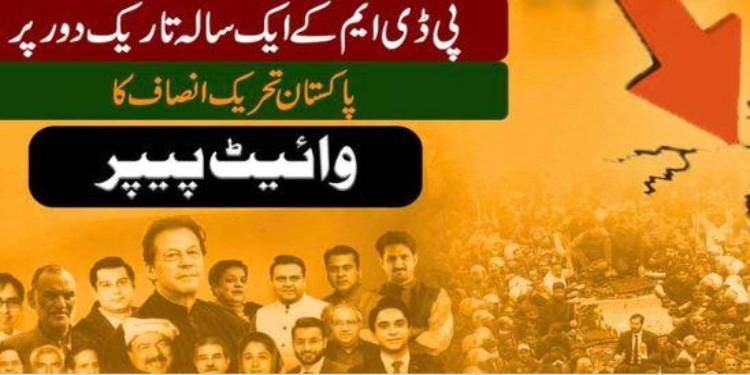
The erstwhile ruling party, Pakistan Tehreek-e-Insaf (PTI), published a "white paper" on the "one-year dark period" of the PDM-led government on Sunday.
The PTI, whose government was overthrown on April 9 of last year by a vote of no confidence in the National Assembly, emphasized in its white paper the "poor governance, rising inflation and other issues" of the current administration.
There are six parts to the 51-page "white paper." The booklet includes information on human rights abuses committed by the current government as well as statistics on inflation and economic collapse.
The white paper also provides information on cases brought against the former prime minister and other party supporters as well as police operation at PTI Chairman Imran Khan's residence in Zaman Park.
The "white paper" also includes changes to the National Accountability Bureau (NAB) laws and the postponing of elections.
On Saturday, Imran Khan vowed to take to the streets if the elections are not held. There is no other option besides voting, he declared.
It is important to note that the Supreme Court (SC) ordered the holding of snap elections on April 4, declaring the Election Commission of Pakistan's (ECP) decision regarding the Punjab and Khyber Pakhtunkhwa (KP) elections null and void. This decision followed the PTI chairman's repeated demands after he dissolved the assemblies in both provinces.
A three-judge panel headed by Chief Justice of Pakistan (CJP) Umar Ata Bandial and including Justices Ijaz Ul Ahsan and Munib Akhtar declared the ECP's plan to hold elections on October 8 rather than April 30 to be unlawful.
According to the Supreme Court's ruling, the ECP's order of March 22, 2023, is invalid, lacking in legal standing or jurisdiction, void from the start, having no bearing on the law, and is hereby revoked.
The ruling stated that neither the Constitution nor the statute gives the commission the authority to move the election's date above the 90-day limit specified in Article 224(2) of the Constitution.
But the government is hesitant to abide by the ruling.
The PTI, whose government was overthrown on April 9 of last year by a vote of no confidence in the National Assembly, emphasized in its white paper the "poor governance, rising inflation and other issues" of the current administration.
There are six parts to the 51-page "white paper." The booklet includes information on human rights abuses committed by the current government as well as statistics on inflation and economic collapse.
The white paper also provides information on cases brought against the former prime minister and other party supporters as well as police operation at PTI Chairman Imran Khan's residence in Zaman Park.
The "white paper" also includes changes to the National Accountability Bureau (NAB) laws and the postponing of elections.
On Saturday, Imran Khan vowed to take to the streets if the elections are not held. There is no other option besides voting, he declared.
It is important to note that the Supreme Court (SC) ordered the holding of snap elections on April 4, declaring the Election Commission of Pakistan's (ECP) decision regarding the Punjab and Khyber Pakhtunkhwa (KP) elections null and void. This decision followed the PTI chairman's repeated demands after he dissolved the assemblies in both provinces.
A three-judge panel headed by Chief Justice of Pakistan (CJP) Umar Ata Bandial and including Justices Ijaz Ul Ahsan and Munib Akhtar declared the ECP's plan to hold elections on October 8 rather than April 30 to be unlawful.
According to the Supreme Court's ruling, the ECP's order of March 22, 2023, is invalid, lacking in legal standing or jurisdiction, void from the start, having no bearing on the law, and is hereby revoked.
The ruling stated that neither the Constitution nor the statute gives the commission the authority to move the election's date above the 90-day limit specified in Article 224(2) of the Constitution.
But the government is hesitant to abide by the ruling.

